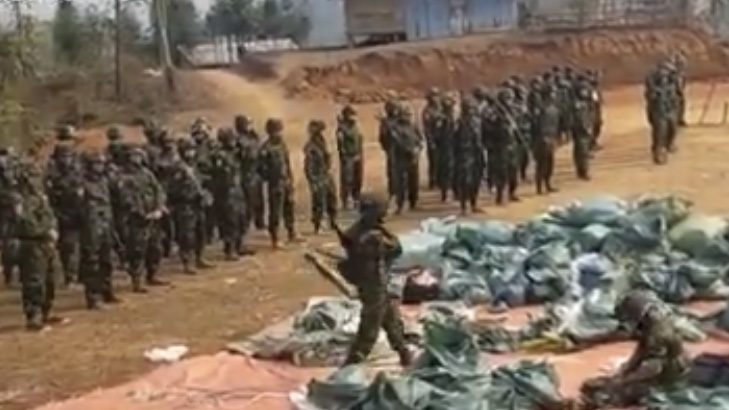Myanmar airstrike kills 80 in Kachin: Aung San Suu Kyi and UK legacy
Sawako Utsumi and Lee Jay Walker
Modern Tokyo Times

Myanmar was beset by ethnic, religious, and political tensions before Aung San Suu Kyi was ousted. Since her arrest, Myanmar is similar to the oppressive days of the past. Therefore, the crackdown by General Min Aung Hlaing crushed the hope of a gradual democratic process that would have become more inclusive.
Modern Tokyo Times warned in 2019 of the negative role of the international community during the leadership of Aung San Suu Kyi. It was said, “Myanmar is seeking to stabilize the democratic path despite countless ethnic issues that beset this nation based on the result of decades of authoritarian rule. However, negative media campaigns in Western and Islamic nations are hindering the political leaders of this country – that seek foreign capital. Therefore, if Myanmar is handed to China on a plate – or democracy is supplanted – look no further than the deeds of hypocritical Western and Islamic nations.”
Since the ousting of Aung San Suu Kyi, the oppression she faces at the hands of the state apparatus mirrors that of the fate of Myanmar.
The BBC reports, “Her move to solitary confinement makes her more isolated than ever – she became a global democracy icon during a previous period of military rule when she spent 15 years in detention, but almost all of it was under house arrest.”
The latest military attack in Kachin State is one of too many to count – even if the death toll from this airstrike is unusually high.
The Guardian reports, “Sunday’s celebration of the 62nd anniversary of the founding of the Kachin Independence Organisation (KIO) was held at a base also used for military training by its armed wing, the Kachin Independence Army (KIA). It is located near Aung Bar Lay village in Hpakant township, a remote mountainous area 600 miles (965km) north of Yangon.”
ABC News reports, “Air strikes by Myanmar’s military killed as many as 80 people, including singers and musicians, attending an anniversary celebration of the Kachin ethnic minority’s main political organization, members of the group and a rescue worker said Monday.”
The airstrikes also killed KIA troops and Kachin business leaders. Myanmar immediately defended the bombing by stating that the attack was against the 9th Brigade of the KIA.
Myanmar troops are also being killed by various ethnic and political militias. The Irrawaddy reports, “Nearly 20 Myanmar junta troops were reportedly killed in the last three days as People’s Defense Force groups (PDFs) and ethnic armed organizations (EAOs) continued their attacks on regime targets across the country.”
Despite endless persecution, the “candlelight” of Aung San Suu Kyi stands out in Myanmar. If only the democratic world had sought to understand the predicaments she faced while in power – and how Aung San Suu Kyi was (and is) the best hope for Myanmar in this period of history.
British colonial legacy in Myanmar (Burma) and ethnic divisions
Global Security says, “By 1887 Burmans were no longer taken into the colonial army. The British felt the “loyal Karens” were more trustworthy as soldiers, along with–in later years-the Chins and Kachins. The Shan states were brought under British rule by 1889, the sawbwas retaining their traditional powers.”
Harvard Divinity School reports, “Prior to the arrival of the British, education took place within the Sangha and most young men passed through monasteries as novice monks. In addition to providing an education and a religious vocation, the Sangha garnered respect for the monastic community. The arrival of British colonial policy in Burma fundamentally undermined this system, and is at the heart of contemporary intercommunal and interreligious violence. By undercutting Burmese political and religious authority, the British marginalized the Burman community while granting ethnic minorities access to power. The British introduced a radically different educational system from the traditional Sangha, basing the new system on secular modernity. Most of the graduates of the new system joined the ranks of civil servants in the colonial administration. The Sangha resisted this Western education, maintaining that secular knowledge contradicted a Buddhist worldview.”
Myanmar continues to suffer from the endless convulsions of British colonial rule. For example, the British altered the religious and ethnic dynamics of Rakhine negatively against the indigenous Buddhists, the British armed varied ethnic groups at the expense of the Burmans (the Bamar), destroyed the role of the Buddhist clergy, usurped the monarchy and exiled the King to India, and did other brutal deeds. Therefore, similar to ongoing convulsions that impact Sudan to Myanmar – and internally in Northern Ireland – the colonial legacy set in motion greater ethnic and religious animosity.
Myanmar faces an endless cycle of violence and the possibility of another Yugoslavia. Hence, it is incumbent on the ruling military junta to somehow start a new building process that includes Aung San Suu Kyi. Also, genuine peace talks need to start afresh with various ethnic groups – including temporary truces that are abided.
Opposition anti-junta forces will oppose the above because they seek to overthrow the ruling military and political elites – that crush democracy and hope. However, ordinary people in Myanmar need a break from the endless cycle of violence and the hope that all sides will come to the table – even if hatred and distrust continue.
If all sides continue to up the ante, then the disintegration of Myanmar is a distinct possibility.
The situation is extremely dire in Myanmar.

PLEASE DONATE TO HELP MODERN TOKYO TIMES
Modern Tokyo News is part of the Modern Tokyo Times group
DONATIONS to SUPPORT MODERN TOKYO TIMES – please pay PayPal and DONATE to sawakoart@gmail.com
http://moderntokyotimes.com Modern Tokyo Times – International News and Japan News
http://sawakoart.com – Sawako Utsumi’s website and Modern Tokyo Times artist
https://moderntokyonews.com Modern Tokyo News – Tokyo News and International News
PLEASE JOIN ON TWITTER
https://twitter.com/MTT_News Modern Tokyo Times
PLEASE JOIN ON FACEBOOK